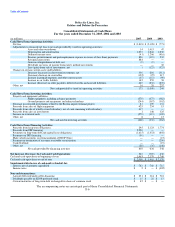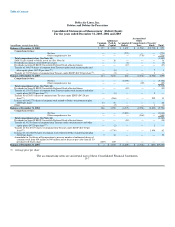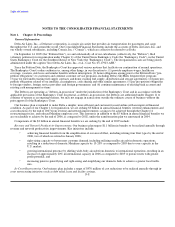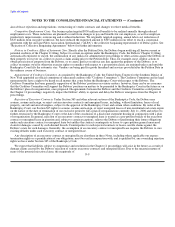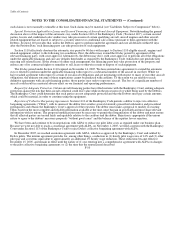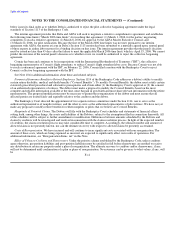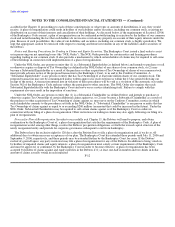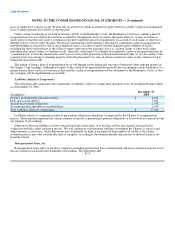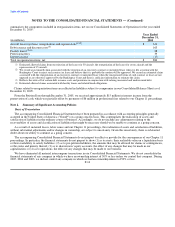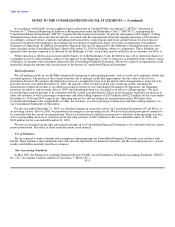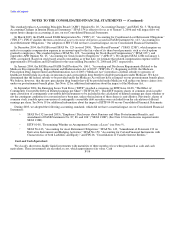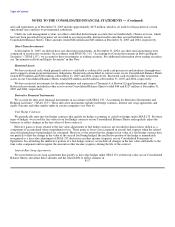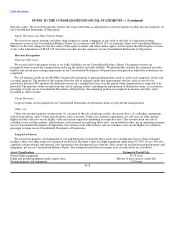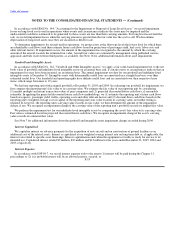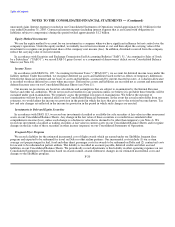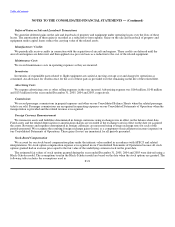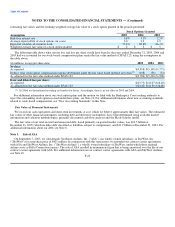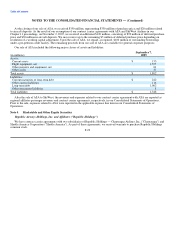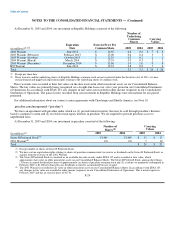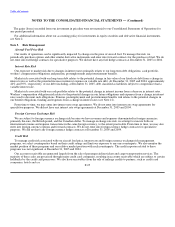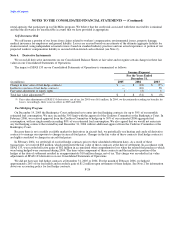Delta Airlines 2005 Annual Report Download - page 78
Download and view the complete annual report
Please find page 78 of the 2005 Delta Airlines annual report below. You can navigate through the pages in the report by either clicking on the pages listed below, or by using the keyword search tool below to find specific information within the annual report.
Table of Contents
NOTES TO THE CONSOLIDATED FINANCIAL STATEMENTS — (Continued)
This standard replaces Accounting Principles Board ("APB") Opinion No. 20, "Accounting Changes" and SFAS No. 3, "Reporting
Accounting Changes in Interim Financial Statements." SFAS 154 is effective for us as of January 1, 2006 and will impact how we
report future changes in accounting, if any, on our Consolidated Financial Statements.
In March 2005, the FASB issued FASB Interpretation No. ("FIN") 47, "Accounting for Conditional Asset Retirement Obligations"
("FIN 47"). FIN 47 clarifies the term conditional asset retirement obligation as used in FASB Statement No. 143, "Accounting for
Asset Retirement Obligations." Our adoption of FIN 47 did not have a material impact on our Consolidated Financial Statements.
In December 2004, the FASB issued SFAS No. 123 (revised 2004), "Share-Based Payment" ("SFAS 123R"), which requires an
entity to recognize compensation expense in an amount equal to the fair value of its share based payments, such as stock options
granted to employees. This standard replaces SFAS No. 123, "Accounting for Stock-Based Compensation" ("SFAS 123"), and
supersedes APB Opinion No. 25, "Accounting for Stock Issued to Employees" ("APB 25"). We adopted SFAS 123R on January 1,
2006, as required. Based on stock based awards outstanding as of that date, we estimate that related compensation expense will be
approximately $50 million and $20 million for the years ending December 31, 2006 and 2007, respectively.
In January 2004, the FASB issued FASB Staff Position No. 106-1, "Accounting and Disclosure Requirements Related to the
Medicare Prescription Drug, Improvement and Modernization Act of 2003" ("FSP 106-1"). Beginning in 2006, the Medicare
Prescription Drug, Improvement and Modernization Act of 2003 ("Medicare Act") introduces a federal subsidy to sponsors of
healthcare benefit plans in certain circumstances and a prescription drug benefit to eligible participants under Medicare. We have
determined that the federal subsidy to be provided under the Medicare Act will not have an impact on our postretirement benefit plans.
We believe, however, that the new prescription drug benefit that will be provided under Medicare will reduce our future claims costs
under our postretirement benefit plans. See Note 12 for additional information about the impact of the Medicare Act.
In September 2004, the Emerging Issues Task Force ("EITF") reached a consensus on EITF Issue 04-08, "The Effect of
Contingently Convertible Debt on Diluted earnings per Share" ("EITF 04-08"). This EITF requires shares of common stock issuable
upon conversion of contingently convertible debt instruments to be included in the calculation of diluted earnings per share whether or
not the contingent conditions for conversion have been met, unless the inclusion of these shares is anti-dilutive. Previously, shares of
common stock issuable upon conversion of contingently convertible debt securities were excluded from the calculation of diluted
earnings per share. See Note 19 for additional information about the impact of EITF 04-08 on our Consolidated Financial Statements.
During 2003, we adopted the following accounting standards, which did not have a material impact on our Consolidated Financial
Statements:
• SFAS No 132 (revised 2003), "Employers' Disclosures about Pensions and Other Postretirement Benefits, and
amendment of FASB Statements No. 87, 88, and 106" ("SFAS 132R") (See Note 12 for disclosures required under
SFAS 132R).
• EITF 01-08, "Determining Whether an Arrangement Contains a Lease" (see Note 9),
• SFAS No 143, "Accounting for Asset Retirement Obligations," SFAS No. 149, "Amendment of Statement 133 on
Derivative Instruments and Hedging Activities;" SFAS No 150, "Accounting for Certain Financial Instruments with
Characteristics of both Liabilities and Equity;" and FIN 46, "Consolidation of Variable Interest Entities."
Cash and Cash Equivalents
We classify short-term, highly liquid investments with maturities of three months or less when purchased as cash and cash
equivalents. These investments are recorded at cost, which approximates fair value. Cash
F-16


